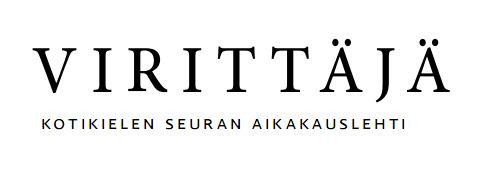Historiallisen toimijuuden rakentuminen lukiolaisten esseevastauksissa
DOI:
https://doi.org/10.23982/vir.59310Avainsanat:
tekstitaidot, historia, essee, systeemis-funktionaalinen kieliteoriaAbstrakti
Artikkelissa tarkastellaan historiallisen toimijuuden representoitumista osana tiedon rakentumista lukiolaisten kirjoittamissa dokumenttipohjaisissa esseissä. Tutkimuksen aineistona on 23 historian esseetä, joiden tehtävänantona on pohtia kylmän sodan aloittajaa annetun oheisaineiston valossa. Artikkelissa tekstitaitoja lähestytään sosiokulttuurisesti rakentuvina ja tiedonalakohtaisina taitoina. Esseiden kielen piirteiden tarkastelu sidotaan siis historian tiedonalan tiedonmuodostukseen sekä koulu-kontekstiin liittyviin piirteisiin.
Artikkelin teoreettinen ja metodologinen viitekehys pohjautuu systeemis-funktionaaliseen kieliteoriaan. Historiallista toimijuutta lähestytään transitiivisuus-systeemin sisällä tehtävän prosessityyppianalyysin avulla eli tarkastellaan, kuka tai mikä esseissä esitetään tapahtumia aikaansaavaksi tahoksi ja millaisena toimintana tapahtumat näyttäytyvät. Analyysin perusteella historiallinen toimijuus vuorottelee esseissä yksilöityjen henkilöiden ja ihmisjoukkoon viittaavien sanojen, kuten valtioiden, välillä. Inhimillinen toimijuus voidaan myös viedä taka-alalle abstraktien toimijoiden ja suhteita kuvaavien prosessien avulla.
Tutkimuksen perusteella esseevastaukset heijastelevat niiden tilannekontekstiin kuuluvia tekstejä ja diskursseja: Toimijuuden rakentamisessa hyödynnetään yleisiä analyyttisen kielen piirteitä. Toimijuuden tasojen vaihtelut henkilöiden, ihmisjoukkojen ja abstraktien toimijoiden välillä kietoutuvat myös esseen tekstilajiin ja tehtävänannon esseille asettamaan kehykseen sekä historian tiedonalan tiedonrakennustapoihin, kuten tulkinnallisuuteen ja syy-seuraussuhteiden esittämiseen.
The construction of historical agency in students’ essays
The article examines the representation of historical agency as part of constructing knowledge in document-based essays written by upper secondary school students. The data studied consists of 23 history essays, in which the students were asked to discuss what instigated the Cold War. The article is based on a sociocultural view of literacies and on the concept of disciplinary literacies, and the linguistic features of the essays are therefore linked to the knowledge construction features of the discipline of history.
The theoretical and methodological framework of the article is based on the systemic-functional language theory. Historical agency is approached through a process type analysis within the transitivity system of the theory, focusing on who or what is represented as an agent behind the processes, and the ways in which historical events are represented as actions. According to the analysis, historical agency alternates between identified people and human collectives. Abstract agents and relational processes can also place human agency into the background.
The essays reflect the texts and discourses within their context of situation. In constructing agency, some general features of analytical language are used. The alternation of agency between human beings, human collectives, and abstract agents also intertwines with the genre and the assignment of a school essay. Furthermore, it is linked to the important features of knowledge construction in the discipline of history, such as cause and correlation and the interpretative nature of knowledge.





